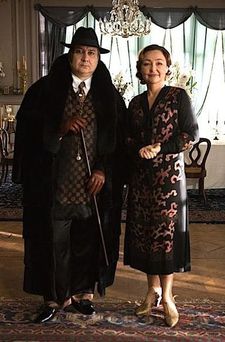 |
| Xavier Giannoli: "The importance of Billy Wilder for me was tenderness and cruelty." Photo: Anne-Katrin Titze |
My conversation with the Marguerite director ranged from Erik Satie's food habits, Salieri in Milos Forman's Amadeus, tribute to Jean Renoir's The Rules Of The Game, John Huston's The Man Who Would Be King, Erich von Stroheim in Sunset Boulevard, Robert Redford in Sydney Pollack's Out Of Africa and Karen Blixen, Meryl Streep in Stephen Frears' Florence Foster Jenkins, Woody Allen's Broadway Danny Rose, Danny Kaye and the Carnegie Deli, Charlie Chaplin, Tristan Tzara to Margaret Dumont and the Marx Brothers.
 |
| Catherine Frot as Marguerite: "It's the story of a woman who needs love." |
When I brought up Michael Shannon and Jeff Nichols' latest film, Midnight Special (after Shotgun Stories and Take Shelter and Mud), Xavier Giannoli said that in Paris there are posters stating "We found the new Spielberg".
Marguerite stars César Best Actress winner Catherine Frot with André Marcon, Aubert Fenoy, Denis Mpunga and a flock of enablers. Peacocks make the strangest sounds. They have that in common with Marguerite Dumont (Frot), the heroine of Xavier Giannoli's tale of a wealthy woman in early 20th century France who loves nothing more than singing opera - but is, unfortunately, completely tone-deaf. Cowardly, unfaithful husband Georges (Marcon) avoids her, and embarrassment keeps those around her from speaking the truth.
When young Dadaist Kyrill Von Priest (Fenoy), a figure based on Tristan Tzara, and his friends discover her uniqueness - the lady also eats only white food and has her butler take the 1920s equivalent of selfies - new worlds open up for all of them. Marguerite, based on the real-life American off-key phenomenon Florence Foster Jenkins, is shown as a very lonely woman whose state of awareness is in question and whose talent for denial is anybody's guess.
 |
| Atos and Marguerite |
Anne-Katrin Titze: Are there parts of Marguerite you identify with?
Xavier Giannoli: Everything.
AKT: Everything? It's like Flaubert? "Emma Bovary, c'est moi"?
XG: Of course. It's the story of a woman who needs love. And we all need love. Sorry to say such a cliché. There is something about innocence, I suppose, that was in the body language and the wings. The name of my son is Gabriel, like the angel. And I am obsessed with cinema as she is obsessed with music and opera. It's difficult to find the distance with the violence of reality and the hypocrisy of the world. The first line I wrote on my page was "We all need illusion to stay alive." The illusion can help us to stay alive and it can kill us. I am trying to make the film in the middle of these questions.
AKT: And you only eat white food?
XG: You know where that is coming from? It was Erik Satie. I've tried it. It was very easy.
AKT: What did you eat?
XG: Chicken, fish, rice, leeks, the inside of apples is white - so it's very easy. I read this line by Satie and thought for Marguerite that's great, because it's completely crazy.
AKT: It matches her wings.
XG: She is a martyr, of course. As is always the case in opera. All the women are suffering in most Italian and German operas.
 |
| Marguerite with mentor Atos Pezzini (Michel Fau) |
AKT: You have Marguerite say, "I adore suffering."
XG: You know, I wanted to be a priest when I was very young. But I was obsessed with women's breasts. So it was impossible to…
AKT: … Combine them?
XG [laughing]: Some priests can! I've heard about it.
AKT: Spotlight.
XG: Yeah. When I was 15 years old, it was not possible. And I was struggling with these two strands. That's why [in Marguerite] everything happens at this place with the cross. Of course, there is a Christian problem in the history of art, when the desire and the law are fighting. When you taste the suffering as a drug, as heroin… I talked to Catherine [Frot] and said, "Please, when you are saying this line, you taste suffering exactly as someone would taste heroin." I never took heroin but people have told me about the feeling they had.
AKT: The giving up of pleasure is enjoyment in itself. Did you try to balance ridicule, meanness, cowardice? We never know why the people surrounding her are doing what they are doing.
 |
| Marguerite in performance: "I am obsessed with cinema as she is obsessed with music and opera." |
XG: There is the same scene at the beginning and at the end. The first time you can hear Marguerite singing, it's with the Queen of the Night and the audience is on the side of all the people laughing against her. She is ridiculous because it's embarrassing. At the end of the film she is singing - still completely out of tune but you are not laughing anymore against her but with her. There is this idea, even if something is ugly, when you are a Christian, you are supposed to find something of beauty there. Even a murderer is still a human being.
AKT: It's interesting you say that in the beginning the audience is laughing against her. I didn't. She started singing and immediately, I wanted to protect her.
XG: Yeah. Maybe. When I was thinking of the character, I was thinking about a little girl walking in Times Square in the middle of all the cars. And she doesn't know that she can die. I wanted the audience to feel that if someone told her the truth, she was going to die.
AKT: Catherine Frot is good giving off the little girl aura. Was that a reason why you cast her?
XG: It was very difficult. She is supposed to be a 50-year-old woman and I don't want her to look like a stupid crazy little girl. As an actress, it was very difficult to find a balance. Every day on the set it was amazing for me. Marguerite was there. I hope that in the film you can feel that there is the innocence of a child but there is something about illness, too.
AKT: Were you quoting Jean Renoir's Rules Of The Game with the hunt and the dead fowl?
XG: Yes, there was a tribute to Jean Renoir and to many directors I love. I was thinking a lot about Billy Wilder, too.
 |
| Marguerite with her butler Madelbos |
AKT: I noticed Sunset Boulevard hints. The butler channeled Erich von Stroheim?
XG: Of course! My black Erich von Stroheim [Denis Mpunga as Madelbos]. The importance of Billy Wilder for me was tenderness and cruelty.
AKT: That's Billy Wilder alright.
XG: He loves the characters and he beats them. And I'm obsessed with John Huston. There is something about lying in The Man Who Would Be King - I love this film. I'm always thinking about this film. Most of my influences as a director are American movies. It's not a coincidence I took this American character, Florence Foster Jenkins and adapted it to France.
Coming up - Filming in Prague, peacocks, Tristan Tzara, the Dadaist, Margaret Dumont and Groucho Marx, Robert Redford as Denys Finch Hatton in Out of Africa, Salieri and Mozart in Amadeus, Meryl Streep in Stephen Frears' Florence Foster Jenkins, Jeff Nichols' latest film, Midnight Special, Broadway Danny Rose, Woody Allen, Danny Kaye, Carnegie Hall and the Carnegie Deli.
Marguerite opened yesterday in the US and opens in the UK on March 18.





















